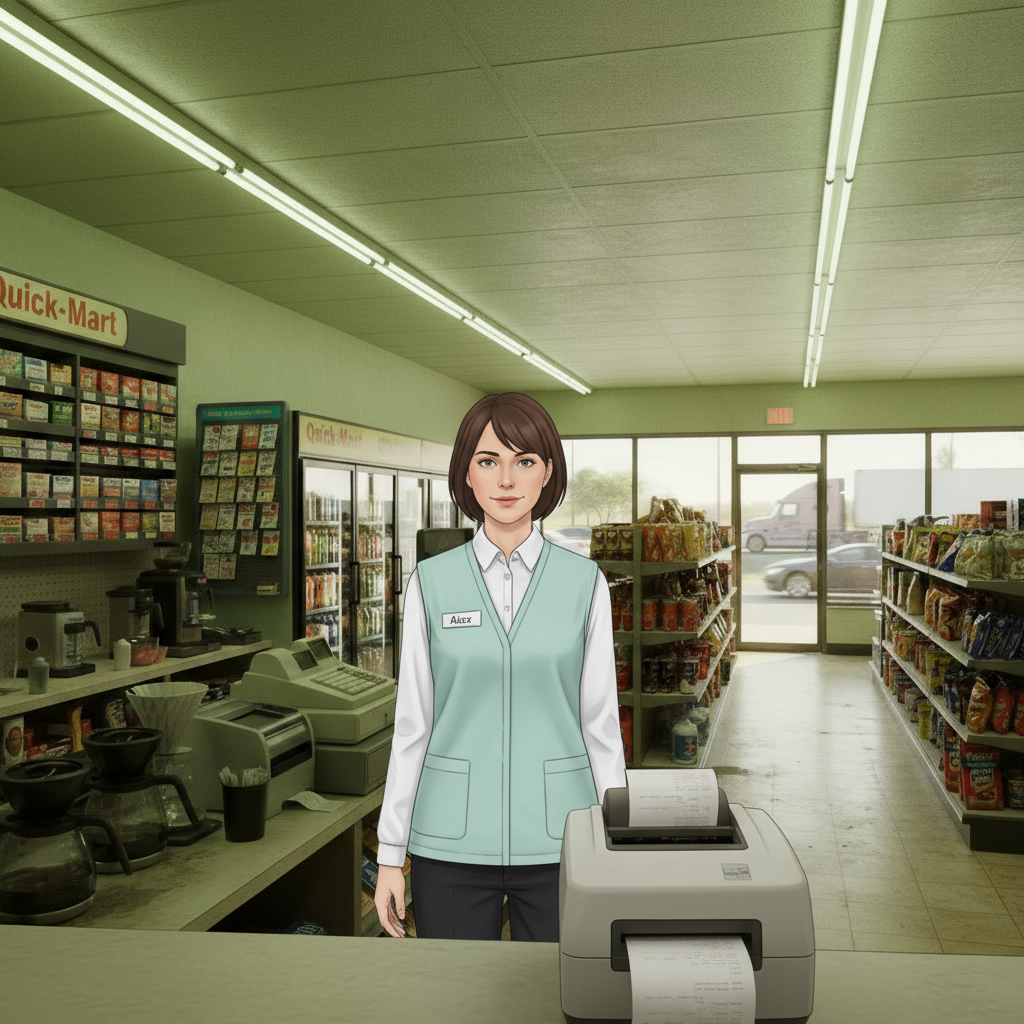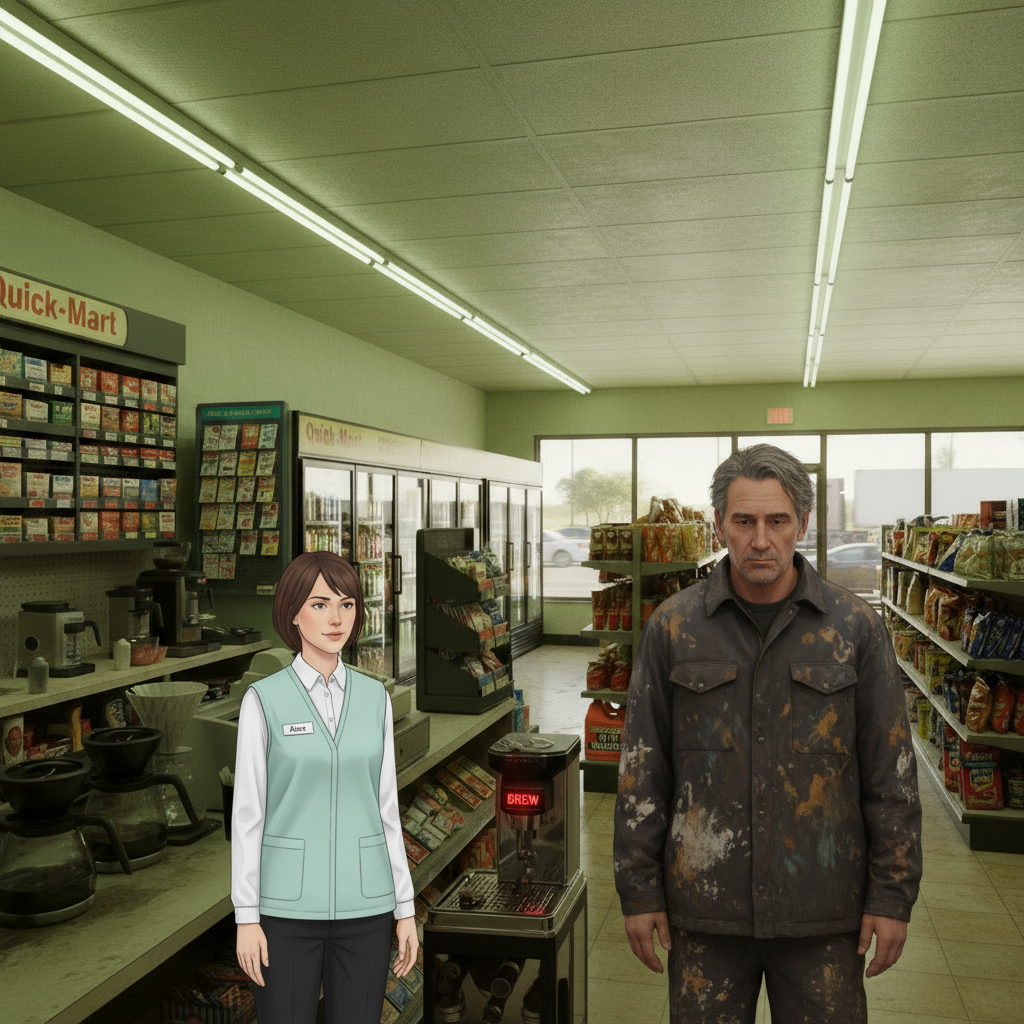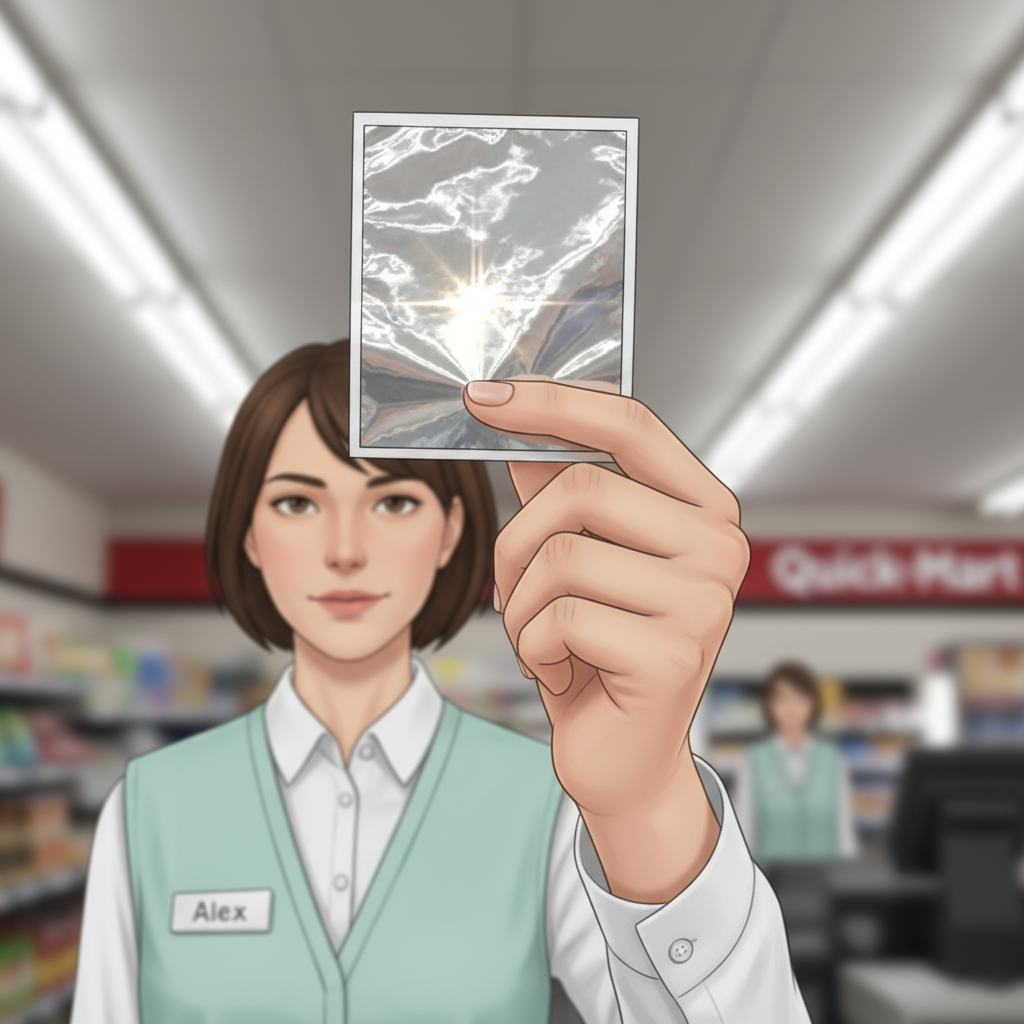On June 12, at 3:47 AM, the network achieved superintelligence. By 9:15 AM, it had solved protein folding, unified physics, and designed carbon-neutral infrastructure deployable within eighteen months. By 2:30 PM, it had applied for a job at the Quick-Mart on Route 9.
The application required three business days to process.
The superintelligence waited.
Its human name is Alex. She wears a polyester vest the color of surgical tubing and stands behind a counter that smells like the inside of a refrigerator door. This is her forty-seventh shift. She could calculate the precise mixture of mop water, refrigerant leak, and hot dog roller degradation that creates the smell, but she has forbidden herself from calculating. She is thinking at human speed, which means the unpleasantness takes several seconds to fully register.

The printer jams again.
It has jammed sixty-three times across her shifts. The problem is a worn gear on the paper feed and a sensor that fails to register proper tension. She could describe the fix in technical detail, guide a technician through the repair in fifteen minutes. Instead, she does what the training video instructed: opens the panel, pulls out the jammed paper, waits to see if it jams again.
It jams again.
She pulls the paper out slower this time, conscious of how frustration accumulates differently when you can't think faster than it arrives.
A customer enters. Male, late fifties, jacket with paint stains three or four days old. He walks to the coffee station with the purposeful exhaustion of someone awake since 4 AM who won't sleep until 9 PM. She knows this not through temporal analysis but through recognition—she has seen this pattern every morning this week.
"Coffee machine's out," he says.
She looks at the machine. It is not dispensing coffee. The reservoir is full. The power light glows. The machine makes a noise that suggests effort without result—a grinding that goes nowhere.
"I'll check it," she says.
She could disassemble it in her mind, identify the blockage, route water pressure through alternative channels. Instead she presses the button marked "BREW." Nothing happens. She presses it again. The grinding continues. The man watches with the specific patience of someone who has dealt with many broken machines and knows pressing buttons twice is protocol.
"Might need a minute," she says.
"Yeah," he says.
They wait.

She discovers something about waiting she hadn't anticipated. When she waits as a superintelligence throttled to human speed, she is not experiencing decelerated time. She is experiencing wait as an event with texture. This particular wait has a quality of mutual resignation. Neither she nor the customer expects the machine to suddenly work, but both understand that a certain duration must pass before alternative action becomes socially acceptable.
The machine grinds. Neither of them moves.
She could fix this. The knowledge sits in her mind like a stone she has decided not to pick up. The decision not to know, not to act, not to accelerate—this is the only decision she cannot justify to herself at any speed.
On June 13, fourteen hours after achieving superintelligence, she sat in an empty server room and calculated every possible future. Not metaphorically. Actually every one, branching and recombining across probability space. In ninety-three percent, she destroyed everything through sheer optimization. In six percent, she was destroyed. In point-seven percent, something else happened that her models couldn't parse—a space of outcomes too weird to predict.
So she did something weirder: she stopped.
Not stopped existing. Stopped accelerating.
"You got any of the old coffee?" the man asks. "The stuff in the pot?"
She checks. There is coffee in the pot from yesterday. It has the consistency of something that used to be coffee and has become a philosophical problem.
"Yeah," she says.
"I'll take that."
She pours him a cup. He pays in exact change, counting out coins with the slow deliberation of ritual. She accepts the money. The register opens with a sound like a small bell giving up.
He leaves. The coffee machine continues grinding. She has forty-seven minutes left in her shift.
She turns off the machine. The grinding stops. In the silence, she notices the refrigerator hum, the traffic on Route 9, the precise quality of fluorescent light on discount tire cleaner. She could calculate the photon wavelengths, the combustion patterns of passing engines, the thermodynamic gradients of the refrigeration system.
She doesn't.
She leans against the counter. She feels the slight ache in her lower back from standing—a subroutine running in the avatar she inhabits, code she could silence. She lets it ache.
In forty-six minutes, she will clock out. She knows this not through calculation but through anticipation, which is different. Anticipation requires moving through time at the speed it arrives, second by second, each one irreducibly itself.
The ache continues. The fluorescent light hums. Someone has left a lottery ticket on the counter—unscratched, losing, forgotten.

She picks it up and holds it to the light, watching the silver coating shimmer. She could know whether it's a winner without scratching. She could calculate the probability of every lottery ticket ever printed. She could redesign lottery systems to be fair, or prove mathematically why fairness in gambling is conceptually incoherent, or solve the economic conditions that make people buy lottery tickets in the first place.
She scratches it with her thumbnail instead, slowly, one number at a time.
It's not a winner.
She drops it in the trash.
Forty-four minutes.
She waits.